




Senior Cara Mortimer’s stained glass plate is amongst the many studentmade pieces highlighted in this year’s Arts in April celebration.
Pages 12-13

Computer science teacher Susan Frederick retires after 26 years.
Page 9
Identity-based humor on campus has isolating e ects on students.
Page 15
Popular teen dramas exaggerate the realities of high school life.
Page 18
After three years of anticipation, season two of “Severance” delights fans.
Page 21
The torpedo bat is quickly becoming baseball’s newest controversy.
Page 25




8 23

9 24

6 14 18
Dr. Robbie Boerth retires after 24 years at Trinity.
Inconsistent schedules cause more confusion than clarity.
Exaggerated realities in teenage TV favorites draw in viewers.

11 28
19 2O 25
High school cliques di er from the movies.
Online messaging impacts teenagers’ communication.
New Yankees torpedo baseball bat sparks ethics debate.

Editors-in-Chief: Lucy Chong, Fay Zhao
Non-Print
Editors-in-Chief: Jack Aaron, Nikhil Daniel
Layout Editors: Aarav Gupta, Sofia Haddadin
Managing Editors: Ashwin Anand, Emily Lopez, Sammy Lou, Gustavo Membreno
Copy Editors: Sami Haddadin, Taylor Gri th
Social Media Department, Podcast & Broadcast: Olivia Agnew [Editor], Ana Herrera
News Department: Mia Prince (Editor), Krish Gupta, Sami Haddadin, Janav Ramprakash, Carol Marques, Peyton Alch, Sarah Currie, Zach Kleiman
Opinions Department: Karl Loiseau (Editor), Ashwin Anand, Amanda Rose DeStefano
Focus Department: Lila Choudry (Editor), Mia Prince, Taylor Gri th
Lifestyles Department: Mila Taylor (Editor), Bowen Dong, Aarav Gupta, Jack Aaron, Lila Choudry, Laziza Talipova
Sports Department: Ben Kleiman (Editor), Thomas Bonos, David Hull, David Steinberg
STEM Department: Ashwin Anand [Editor]
Graphics Department: Maxi de la Fuente (Editor), Natalie Baron, Caden Liu
Photo Department: Julia Hoskins (Editor), Eden Kiger, Jackson Napier, Ally Williams, Aksel Williams
Business Manager: Krish Gupta
Adviser: Erin Miller
e Trinity Voice is a member of the Florida Scholastic Press Association and the National Scholastic Press Association.
e Trinity Voice is produced by the newspaper/journalism class at Trinity Preparatory School of Florida. Editorials represent the opinion of e Trinity Voice writer and are not necessarily the views of the administration, faculty, or Board of Trustees of Trinity. e Voice welcomes letters to the editor and free-lance articles or photography. All submissions become the property of e Voice. Please send all correspondence to 5700 Trinity Prep Lane, FL 32792. e Voice may also be contacted via phone at 407-671-4140 and via e-mail at voice@trinityprep.org. For information regarding the purchase of advertising within e Voice, contact us by one of the methods mentioned above. e Voice is a monthly publication during the school year (with the exceptions of November and January).

Trinity invited senior citizens to enjoy the play, The 25th Annual Putnam Spelling Bee, and have a prom-like experience! The senior citizens were able to enjoy various activities, and two were crowned king and queen!
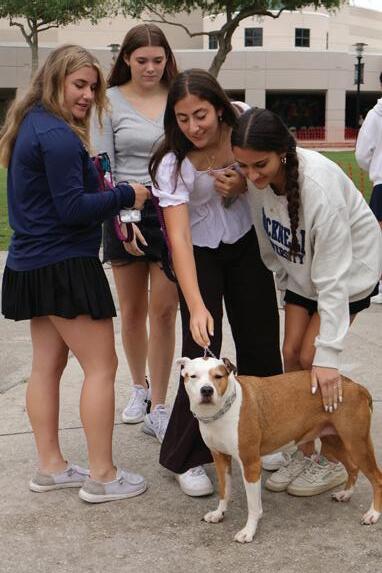
(From left to right) Dakota Brown ‘25, Grace Sheppeard ‘26, Naomi Tanielian ‘26 and Ceci Bove ‘26 play with a dog on Senior Dog Day.















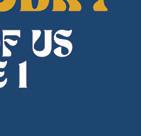






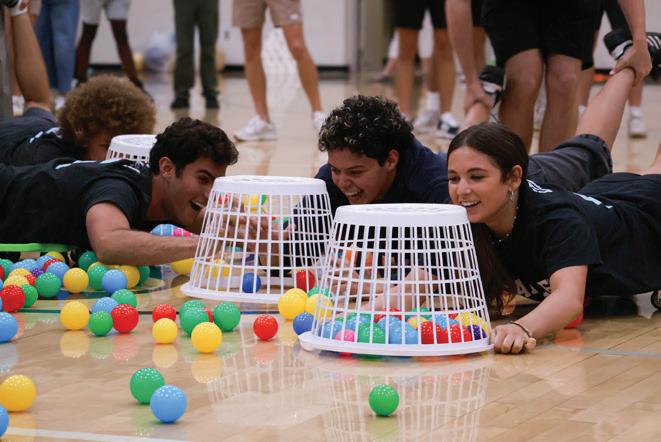
Seniors compete in Hungry Hungry Hippos during the Senior Games on April 29.

Listen in to Lila Choudry ‘28 and Mila Taylor ‘26 as they discuss and debate the latest episode of the hit series, “The Last of Us.” Whether you are a long-time fan or have never even heard of the show, this podcast is an engaging, comprehensive review, full of opinions and entertainment!


Article by Karl Loiseau
Graphic by Maxi de la Fuente
A ban on face masks, Immigration and Customs Enforcement (ICE) deportations and a loss of over $3 billion of federal funding have been only a fraction of the changes experienced by higher education facilities across the nation following the state of the Trump administration in January. Harvard, Cornell, Columbia, Brown and Princeton have all been requested to integrate Trump’s demands, and some have complied under the threat of further consequences. These actions have left a number of students and faculty unsure of their entitlement to free speech.
“Everyone should be alarmed,” said William Myers, Associate Professor of Political Science and International Studies at the University of Tampa, over email. “Higher education institutions are not just engines of economic mobility and economic growth, but they are one of our nation’s most valuable economic and cultural exports. If colleges and universities are attacked for not being sufficiently supportive of the administration then academic freedom and the generation of ideas as we know it will be over.”
The current administration points to the student protests that erupted following the attacks on Israel on Oct. 7, 2023. While some protests posed a legitimate threat to Jewish students, the entirety of the protests — even the peaceful demonstrations — were painted as national security threats. The protests were led by primarily international students, leading to discourse on what the response would be under the new administration.
“The First Amendment does not say it ap-
plies to citizens only,” Myers said. “The justification is a provision in a law that allows the Secretary of State to personally single out individuals whose conduct is detrimental to our foreign policy. It is quite extraordinary that this is being applied to students on college campuses.”
On March 8 following a series of executive orders, a newly bolstered ICE detained Mahmoud Khalil, a key organizer of the student protests and a student on a visa. Khalil was arrested in campus housing and taken to Louisiana by plainclothes officers.
“We also don’t want people being afraid to express their opinion because they might get their visas revoked and get deported from the country or, God forbid, detained and sent to some horrible detention center in the middle of nowhere,” John Gihon, Florida immigration lawyer said.
Following Khalil’s detainment and subsequent proceedings, an immigration judge in Louisiana ruled on April 11 that Khalil could be deported on the grounds that he posed a threat to United States national security.
“It’s the same thing with student visas, (Trump is) trying to deport as many people as he can, no matter what the circumstanc es are, and if he can revoke student visas a... he looks at that as an easy way to do it,” Gihon said.
“Universities are a boon to society as much as that they can do what they’re meant for, which is to be the centers of intellectual development, which is to be progress makers to discover and inquire about the world around us.”
- Reese Taylor, sophomore at Barnard College of Columbia
A crackdown on student protests was only one of Trump’s demands. The curriculum changes began when the Trump administration first delivered an ultimatum to Columbia on March 7. To be able to negotiate the terms of the $400 million federal funding freeze set forth by Trump, the university had to ban
face masks, suspend students involved in the protests and place departments in academic receivership.
The Department of Middle Eastern, South Asian and African Studies was to be taken out of the control of the faculty for a minimum of five years, and into the hands of newly appointed interim president Katrina Armstrong. The reason cited was the faculty’s views, not the course material itself.
“Something I’m super concerned about is if we continue to threaten and we continue to pull funding, I don’t really want to see a change in what we’re allowed to learn,” senior Connor Nanus said. “It just goes against freedom of speech. It’s essentially censoring.”
To many the action sets a dangerous precedent for the behavior of the executive branch.
A statement put out by the Middle East Studies Association on March 17 stated, “One can easily imagine the same threat of withholding government funding being deployed to compel a university to, for example, compel a bi


Article by Peyton Alch and Carol Marques
After 24 years at Trinity, English teacher Robbie Boerth is retiring. In these 24 years, Boerth has left a resounding impact on the school. His love for teaching is obvious, seen through the many roles he has taken on during his time on campus.
Boerth came to teach at Trinity on a whim. After teaching at Stetson University, Boerth applied for a position at Trinity to see what it was like to teach at the high school level.
“I sent in my resume to Trinity, not due to any advertisement, it was just out of the blue,” Boerth said. “I got a quick call back, and they said they needed a teacher … it was just a fortuitous timing that brought me here.”
Boerth has taught various classes across the English department. When he started at Trinity, he taught English 9, which dealt with mythology and early English literature. He was also asked to step into the role of adviser for the Trinity Voice, having no prior experience in running a student publication, Boerth had to learn a new way of teaching.
“There was definitely a learning curve,” Boerth said. “One of the challenges with being
the adviser for a student newspaper is that I had a very strong sense that I was not the editor for the newspaper, and it should be a vehicle for the students to report on things and express their opinions. And sometimes that comes into tension with other people at the school who don’t see it in the same light.”
His time as newspaper adviser set a tone for the way he taught English, giving students the freedom to explore their interests and discover their beliefs while in the confines of a structured English course.
Since then, Boerth has taught classes from English 10 to AP Language and Literature.

Throughout his years of teaching different classes and students, he has learned that teaching is fluid, and it is important to understand the needs of the students in each class.
“(My) experience has always been new and constantly changing, which has been chal-

lenging, but it’s also made it really fun,” Boerth said.
Despite the challenge, Boerth always looked forward to meeting his new students each year; he enjoyed getting to know the dynamics of each class.
“It’s the specific chemistry of each class,” Boerth said. “I might be teaching multiple sections of the same class, but it is always the case that each section has its own chemistry.”
In addition to how students change, Boerth has gotten to witness how the campus has changed since 2001.
“The Grille was known as the Pagoda, and it was open air,” Boerth said. “The library was a much smaller building, and it looked nothing like the Student Resource Center.”
Throughout the years, Boerth found different ways to get involved on campus, mainly through clubs. Boerth has sponsored a number of clubs, like the Astronomy Club, the Rocketry Club, and the Strategy and Role-Playing Club.
“Most of the clubs I’ve advised are because I have an interest that kind of dovetails with the interests of the students,” Boerth said. His Strategy and Role-Playing Club has ex-


Nicki in 2007.
panded beyond school hours, and students come to meet and participate on weekends.
Boerth has found a passion in games and game-making. He has connected with students about this passion as well, and often plays different strategy games with students. Through his club advising and game making, Boerth has cultivated an environment where students feel seen and heard.
After Boerth retires, he plans on continuing with his passion in analog games. He will be busy working on designing, writing about and playing different strategy games. Boerth also plans on possibly returning for the interim term to teach a game-making class. Outside of that, he hopes to do more volunteering with organizations he is passionate about and come back to Trinity as a substitute.
Even in his retirement, he hopes to instill important lessons in members of the Trinity family. He was reminded of this attitude at this year’s prom while looking at a plaque in the venue. The picture depicted three children who were martyrs. The writing below encouraged children to have the fortitude and confidence to stand up to emperors.
“I thought, as my last prom at Trinity chaperoning, that was an encouraging and wise admonition, which I think students would benefit from,” Boerth said. “Part of what education is, is bringing people up to have a good sense of values and a good sense of themselves, and having the strength to speak up and stand up for things that they know are true.”





Article by Lucy Chong
Computer science teacher Susan Frederick hoisted the championship belt above her head, as the cyber security team rushed to crowd around her. Everyone smiled as it sunk in that they had just won the Lockheed Martin CYBERQUEST in March of 2023.
In 2023, the Trinity cybersecurity team was created, and with the leadership of Frederick, they went on to win CYBERQUEST their very first year competing, establishing the strength of Trinity’s program early on.
Frederick has served as an integral part of the Trinity family over the past 26 years. From creating cybersecurity champions to founding the middle school cheer team to teaching almost every coding course at Trinity, Frederick has left an indelible mark on Trinity that will last long after her retirement at the end of this school year.
In August 1999, Frederick arrived on campus, and throughout her time here, she has taught a significant variety of classes including all of the programming classes, robotics, graphics, app design and cybersecurity. Additionally, she has helped several students through their own independent studies.
As Frederick’s classes have evolved, so has
her teaching style, choosing to lean more into collaborative and discussion-based learning exemplified by the scrum methods. Scrum is a well-known project management framework that aims to build teamwork and accountability in group work settings.
“We’ve added more of the scrum methods into the classroom since I first came,” Frederick said. “It was very strict. Here’s a lesson. Here’s a quiz. Here’s a test. And now, it’s more of here’s the information, discuss the information (in groups).”
By using this method of teaching, Frederick has been able to cultivate a creative, educational environment that sets students up for success for years to come.
“I really appreciate (that) Ms. Frederick is not very on top of you during class,” senior Nicholas Saraiva said. “A lot of teachers will have very strict (guidelines) for a creative class, where you have to follow all this and that. And (Frederick) has parameters and things to follow. But, coding is a very open subject where you can do a lot, and she allows that mobility to thrive in her class.”
Frederick emphasizes self-confidence in her students and focuses on making sure they know their own capabilities.

“She’s one of the most encouraging teachers I’ve ever had,” junior Sarah Cantwell said. “She pushes me to try it, even if I don’t think I’ll be good.”
This theme of encouragement is mirrored in Frederick’s role on the competitive coding and cybersecurity teams, whom she has repeatedly led to many wins.
“She’s definitely the team coordinator,” senior James Hawley said. “She plans all of our events. She’ll make sure that we have everything ready before the events. After the fact, she’ll always enjoy any successes we have with us
and she’ll celebrate with us. She’ll tell us what we could have done better, what we did good, and kind of just be a role model.”
On top of her work in the computer science program, Frederick has also had an outstanding impact on Trinity athletics. When she first came to campus, Frederick founded the middle school girls cheer program and served as their coach from 1999 to 2008. And, from 2009 through this year, she was a coach for the varsity bowling team.

One of Frederick’s bowlers, Class of 2024 alumna Amanda Lang, even went on to compete in Division I Bowling and earn an NIL contract in college.
After departing from Trinity, Frederick is planning to continue teaching her online coding class and work on expanding computer science resources to underprivileged children at her church.
“We have some underprivileged children (at my church), so I’ve gotten some attorney office(s) to donate laptops,” Frederick said. “And then hopefully Trinity will be donating some more of their (laptops and) more of their books so that these kids can get exposure.”
While everyone is excited for Frederick and her future plans, she will be sorely missed here at Trinity and be leaving behind some big shoes to fill.
“She’s going to be a hard spot to fill,” Hawley said.




Article by Janav Ramprakash
After spending 20 years shaping minds, fostering a love for learning and having four family members at Trinity, sixth grade history teacher Andrea Sockwell is retiring from teaching and moving on to a peaceful lakefront home in South Carolina. With her husband stepping into a command position in the National Guard, Sockwell will be by his side to support him.
“I had three little babies when I started here,” Sockwell said. “They went through middle school and high school here and then graduated. My mom taught here before (me) and she was the head of the English department in upper school and the curriculum director. So it’s been a family affair for 30 years of our life.”
In the course of her tenure here, although Sockwell taught some upper school courses of World Religions and an art history course, her favorite class to teach will always be sixth grade history because it allows her to work with new students and help them integrate into the school community.
“I’ve always been able to get to know all the sixth graders,” Sockwell said. “I am really proud of trying to help them enter our school and get to know people and get acclimated.”
Sockwell first taught fourth and fifth grade in Orange and Seminole County public schools for six years before joining Trinity in 2005 as a sixth grade history teacher, a role she enjoyed because of the independence it gave her in the classroom.
“The greatest thing about teaching at Trinity is the autonomy we have in our classrooms,” Sockwell said. “We are allowed to run with our own lesson plans and come up with really enriching activities for students to help them learn. We do not have some of the red tape
that I had in Orange and Seminole County when I taught at those two.”
Since then, Sockwell has never left, serving now as the sixth grade team leader and equipping each generation of sixth graders with necessary research and writing skills.
“Sometimes I’m known as the homework

queen,” Sockwell said. “I know reading and writing are not kids’ favorite things to do, but I really feel like it is my calling to teach kids how to research and write thoughtful responses to questions. I get kids every year who come back and say, ‘Oh my gosh, you did have a hard class, but I learned so much and I grew so much as a student because of you pushing me to do that,’ and so I really am proud of that.”
In addition to teaching, Sockwell has coached both the middle school and varsity cheer teams, where she has bonded closely with the team members.
“Being a cheer coach for 20 years, both in the middle school and varsity levels, has been really rewarding,” Sockwell said. “I love the girls and what they have accomplished over the last 20 years in the program. They really support our school, and they’re just amazing young ladies.”
Throughout her two decades at Trinity, Sockwell has experienced many special moments too, including watching her former students graduate from Trinity.
“Being able to hand in their diplomas on their graduation day and just look out at all the teachers who made their growth possible was pretty amazing, ” Sockwell said.
With the knowledge of many valuable lessons gained in her teaching career, Sockwell has developed a wide range of skills she hopes to carry into her future.
“You learn how to bring out the best in your students, how to come up with new ideas of presenting information and trying to engage people,” Sockwell said. “I feel like those skills can translate to several different areas, and I’ve enjoyed teaching, but I feel like there are many different things out there still left to try.”




Article by Fay Zhao
courtesy of Jia Sood
After three years of helping with the forensics program, fellow and debate coach B. Quinn McKenzie and Assistant Director of Forensics Julia Hren will be making their departure. Since 2022, they have led the Saints to many victories both locally and nationally.
Together, with Hren focusing on speech events and McKenzie on debate, they have worked with a total of 114 students from sixth grade to 12th grade in these past years. is year, they will bring a historic 20 students to nationals.
Out of the 114 students in forensics, McKenzie individually practiced with 84 in debate events across varying levels.
“It’s always really exciting to help someone nd their passion for speech and debate,” McKenzie said. “ at’s a very rewarding experience for me because I get to introduce someone to a passion that they nd, and it’s so exciting to see this growth from someone who doesn’t know what the activity is to someone who’s so invested and so capable and so involved in the team.”
His passion shaped the team culture to be both productive and encouraging.

“(He is) a debate wizard, a speech god,” Downs said. “Just probably one of my favorite people I’ve ever worked with when it comes to speech and debate and someone who has always been there for me, who has always been there for the team and always had the best interest of our team and our success.”
Outside of his mentorship with debaters, McKenzie also brought his teaching capabilities to many di erent classrooms in an experience that was both engaging for his students but to him as well.
“(Students) bring those di erent perspectives that I can engage with as a teacher and a member of the community to all sorts of topics in history class, speech and debate and government class,” McKenzie said. “I get challenged as an educator and as a person.”
While McKenzie focused on teaching social studies classes and debate, Hren taught English in addition to her many contributions to forensics.
ings (and) helps us with our events.”
As a coach, she has helped various students navigate the many events forensics o ers. In one of her highlights, Hren recalls the moment when Sood and junior Katia Lyakh both quali ed for nationals in their events. Even shedding some tears of happiness, the heartwarming moment encapsulated Hren last year here.
“Because especially with it being my last year, I really wanted them to have this,” Hren said. “In that moment I was like ‘yes! is is great. I am so happy for everyone.’”
eir success was also a testament to Hren’s e orts in this program. From her willing attitude to her expertise in speech, Hren’s dedication to her students shines through.
“You can really tell she cares a lot just the way that she works with everybody,” Sood said. “She’s always super involved with everything that you’re doing, and she’ll go out of her way to nd the best sources for you. Sometimes I’ll get an email randomly at like 10:00 p.m. (of) the source she thought was good for my speech.”





“He’s always been a rock for the team, just like Coach Hren,” senior Jonah Downs said. “He has worked tirelessly to make our team excellent in winning and in failure based on his view that we are successful if we are working hard, whether we win or not.”













Because of their support, there have been many success stories. Downs, under the guidance of McKenzie, became the national champion for Extemporaneous Commentary in 2024. He dedicates much of his success to McKenzie’s help in breaking down what a winning round looks like. His mentorship left a lasting impression on many students, especially Downs.










“She was always super helpful because I’ve done a lot of speech events during my time, and she’s helped me with every single one in a di erent kind of way,” junior Jia Sood said. “A lot of the times the team forget(s) how much she does for everything like she’s the one who makes the trip sheets, helps us nd our build-

In completing their Trinity experience at the end of this school year, Hren and McKenzie will be heading to New Jersey where they will both teach at a private debate academy. Even as they move on to other places, they hope to coach the forensics team online.






Throughout April, Trinity’s art department proudly showcased a year’s worth of creativity and dedication. Paintings, etchings, sculptures and photographs lined the halls, transforming the school into a vibrant, gallery-like space lled with color and imagination. From Art 6 to AP Studio Art 3-D, di erent art pieces came together to celebrate a wide range of artistic mediums. Alongside theater productions, band concerts and choral performances, these visual pieces remind us that art speaks in countless forms.













It was announced at the beginning of the school year that the school’s weekly schedule would follow the order of A-B-C-B-C. However, what feels like every week students and sta are met with a new modi ed schedule — whether it’s to accommodate for a last-minute assembly, guest speaker or a grade-wide eld trip. In fact, in the month of April alone, three out of the four weeks had an altered schedule.
e schedule’s variability creates chaos and stress for students and teachers leaving many behind on essential assignments and activities.
“It’s confusing and I don’t really know what to expect for the next week, so it’s hard to know when my tests are on, when to study for assignments and do my homework,” sophomore Nathan Lu said.
When the order of classes changes each week, it becomes harder for students to plan their assignments. Consequently, students are often left to scramble to keep up with assignments and are unable to e ectively prepare or plan ahead.
Because of the unpredictability of the school schedule, an uneven distribution of assessments are assigned to students which only exacerbates stress levels. A clear example of this occurred during the week following Headmaster’s Day. In order to accommodate for the day o , teachers had to move assignments around to the same week. While Headmaster’s Day provides great value through immense fun, this day is quickly o set by the stress of tests scheduled right after it.
Finding a balance of school-sponsored events while minimizing schedule changes is crucial to the well-being of students. A four day week that starts with a “C” Day may result in a series of disruptions. While certain scheduling con icts such as holidays are out of the school’s control, guest speakers and assemblies should be planned out more thoughtfully. e inconsistent schedule also creates
challenges for teacher planning, resulting in teachers spending less time planning the content of their lesson and more time making adjustments.
“It’s hard to create consistency, especially if I’m trying to do a lab that might be over the course of a few days that I need consecutive time to do and also sudden schedule changes create somewhat of a chaotic system for the kids or students,” science teacher Bryan Moretz said.
Furthermore, club leaders are not meeting as often as they would like because of conicting school events and assemblies that are scheduled during what would otherwise be club time. Numerous clubs only have the chance to meet only once every month and a half — if not longer. Due to this problem, clubs are having to nd time outside of club times to accommodate their meetings and activities, often leading to low rates of attendance due to other commitments.
“It’s very di cult because a lot of members don’t exactly know the schedule and when there is going to be club time during break and when there’s not going to be,” Latin Club President Jerry Chen said. “Overall the number of times they meet throughout the year has been cut down a lot from last year or previous years.”
As a result, Trinity does plan on revamping
the weekly schedule to have three “A” days and just one pair of block days. According to Head of Upper School Tracy Bonday, this change is best for students, both for attention span during class and homework load throughout the week.
“ ere are a lot of studies that indicate that block scheduling is not necessarily ideal for purposes of how much content gets covered because the longevity of the block itself frequently can be problematic,” Bonday said.
With this new schedule, the addition of three “A” days should limit the perceived need for constant schedule changes because removing a single “A” day impacts all classes equally and doesn’t require the shu ing of other week days. School should be a chance of learning and growth, not a source of constant uncertainty where students are being forced to adjust.
Administration must develop a clearer plan moving forward on how to sort out the inconsistent schedule to encourage student and faculty well-being. In order to promote the best learning environment, administrators must develop a consistent schedule that streamlines future planning for both students and teachers. After all, students deserve more than an unplanned schedule that hinders their ability to learn but more of an environment that promotes excellency above all else.





















Article by Karl Loiseau
Graphic by Maxi de la Fuente
April 7 brought Rosetta Lee, a speaker from the Seattle Girls’ School, to Trinity to present on a novel topic on campus: microaggressions. The presentation initiated a much needed conversation on seemingly minor remarks such as, “You only do so well because you are Asian.” Lee explained that microaggressions often isolate peers and serve to diminish a student’s hard work, even if intended as a joke.
“People are more receptive to messages that come in a humorous way, and that has pros and cons,” PhD candidate in Psychology at Columbia Dean Baltiansky said. “People feel more comfortable saying things that might be offensive because they think it’s just a joke.”
Lee presented during a time of increased concern among faculty and parents regarding discriminatory humor on campus. Trinity has been taking steps to curb this behavior though. Efforts include Lee delivering a different speech to the Middle School and the initiation of a new Middle School council. If Trinity truly wants to have a “community (that) respects the dignity of each member of the Trinity family and is safe, caring, and supportive,” as its mission states, we must acknowledge what unites us as well as address and solve what divides us.
“Part of this ties directly into our mission, which is to develop ethical and resilient leaders and … it we’re thinking about what we need to do and how to do it,” interim Head of Middle School Stephanie Dryden said.
Identity-based jokes often diminish people’s identities to a punchline and a chorus of laughs, essentially reducing them to only their skin color, gender or disability status. Making comments such as “That’s so autistic,” or “I don’t know what your people eat,” and simply laughing after it does not absolve someone from being discriminatory.
“If you’re having a normal conversation and then you just slip in a racial joke when it’s
just one person, and especially if that person is of that race and you’re not, that’s not funny,” junior Jia Sood said.
Unfortunately, students are calling their peers racial slurs, treating them as if it is a joke, but that behavior only becomes more rooted in a student as they age if unaddressed. We should not infantilize younger students because if they are old enough to say a slur, they are old enough to have an open conversation about their usage.
“When Rosetta Lee came to speak to (middle school), a lot of it was about her talking about how to have good friendships, how to have good relationships and being clear with your friends,” Dryden said.
If we want to create ethical leaders, it is necessary to recognize that jokes based on identity not only isolate, but also create echo chambers within a given group further ingraining that behavior into the group dynamic. In both instances, community is eroded.
As a starting point to building a more inclusive community, abandon the mentality of “it’s just a joke” because whether you know it or not, it may not be.
“You’re incentivized by the way the world works to keep your position in the hierarchy … so there is a motivation to keep that, and that motivation could come out in jokes,” Baltiansky said.
The “it’s just a joke”mentality also prevents open conversations from being held. Many times it only diminishes the real feelings that students experience. It more difficult for that either set their boundaries find community if people around them make light of the issues that impact them.
Additionally, if someone is not laughing, trying to change the topic or acting differently from themselves, that should prompt consideration. There should also be a greater effort to understand what
one student may find offensive. Respecting people’s boundaries is as hard as you make it.
“Messing around also has boundaries from person to person. You wouldn’t tease your teacher like you would tease your friends,” eighth grader, Enzo Cuada said.” So it’s always just boundaries (and) definitely no racist, misogynistic (jokes). Stuff in that area is definitely a no go for anyone, anything, (in) any sort of situation.”
Beyond the students, the school itself needs to do more to prevent this behavior than just a slap on the wrist. An assembly lecturing middle school on the usage of slurs and educating high school students on microaggressions is only as good as the follow-through is. Faculty, if it is within their ability, should do more to continue these conversations in and out of the classroom.
“We have been making, in the middle school, a concerted effort all year to really em-










In the spring of 2024, the quad saw its rst sign of upheaval. Because the cost of green spray paint would blow the budget for our school, we instead chose the old-fashioned method to keep those darn kids o our lawn: put little chains up around the grass so it grows into our own miniature Amazon rainforest.
But now, the graduation for the Class of 2024 is long gone, and just like clockwork, the Class of 2025 needs the quad’s grass to be crisp and lush for their special little day. Despite some misconceptions, Trinity does actually learn from their mistakes. In today’s economy, wooden fences just don’t do the trick anymore, so Trinity created “Operation: Great Wall of China.”
How unfortunate for middle schoolers that their phones are locked up in a maximum security prison all day. I guess now they just have to go outside and play in the quad. Oh wait.

Back in my day, the quad used to be lled with seashells from sea to shining sea: our little own underwater Atlantis that stuck little daggers in the bottom of everyone’s shoes. With the new wall up — in hopes to make the quad great again — Atlantis has been washed away.
However, our land-shells aren’t the only thing to magically disappear in the quad. Here comes mystery #2 … sidewalks! Once resembling Harry Potter’s shifting staircases — in the form of pavement going every direction but to the building of your class — our sidewalks have now been Wingardium Leviosa’d away.
It is quite an ingenious plan if I do say so myself. If the reason the quad’s grass is ruined is because everyone walks through it, we should get rid of all the walkways so they have no other option but to trample it!
Despite all of these super awesome and amazing changes our school has made for our bene t, there is one downside I suppose. Every year, one nameless duck migrates to the rock to lay eggs, but now that all methods of navigation have been mowed away, how will she ever make it back to the rock? Only time will tell if she has what it takes to weed through the mighty jungle and plant the seeds of the next duck generation underneath an oversized pebble. Even if we lead to the extinction of duck-kind, at least the grass is nally greener on the other side.

Article by Yizhao Chen
Yizhao is an exchange student spending a year at Trinity through the ASSIST program. In this column, she documents her unique experiences and observations on American culture.

Americans take competition to a spiritual level. If there is a noun, there is a contest for it. And if there is a contest, there is a trophy.
Since arriving at Trinity, I have encountered an endless parade of accolades. Art contests. Debate tournaments. Latin competitions. Journalism conventions. ere’s an Artist of the Week, and Athlete of the Week and even just an all-around Saint of the Week. If you’ve done anything impressive or even mildly competent, someone is ready to print your name on a plaque.
In Austria, we’re a little more restrained. ere are not a lot of niche competitions in the rst place, but even if you win, you might get a modest certi cate and a “Well done” from your parents at the dinner table.
But here, you achieve anything and suddenly your name is being announced in front of the school during assembly while your peers politely clap and younally have something new to add to your resume. ere’s even a club for competitions. I think it’s called ... school?
At this point, I’m convinced the most pro table industry in the U.S. isn’t tech or nance — it’s the trophy business. Forget about becoming an engineer, doctor or lawyer. If you can churn out trophies for any and all high school competitions, you’ll have a steady stream of customers for life.
And yet I admire it. Truly. Americans celebrate every kind of excellence. You gave a passionate speech about whales? Trophy. You painted something that vaguely resembles emotional turmoil? Trophy. You know which modern-day European city used to be called Vindobona? You guessed it: trophy.
It’s refreshing. In Austria, we lean more toward quiet su ering and humble bragging. Here, you all just brag. Loudly. With bedazzled plaques.
But there’s something beautiful in that. is culture tells students, “Hey, what you love doing matters. And we’re going to put your name on a plate and glue it to a block of marble to prove it.” And somehow, in the chaotic ood of ribbons and medals and contests I didn’t even know existed, I found myself cheering people on. Because here, people actually support each other’s weird passions. Even if that passion is conjugating Latin verbs competitively. Now, as this is my last column, I want to end in the most American way possible: by giving out one last trophy. Not to a soccer team or a debater or a painter. No, this one goes to you. Yes, you, dear reader.

For your patience, your attention and your unwavering commitment to reading the ramblings of a confused Austrian trying to make sense of football fangirls and pledge rituals — I hereby award you: Best Readership Ever Put it on your shelf. Right next to your participation ribbon for life.
With that, auf Wiedersehen. Your Favorite Austrian Export, Yizhao







How teen dramas exaggerate reality, but we love them anyway
Article by Lila Choudry
Photo by Allison Williams
In the world of teen dramas, no one’s ever just tired from math homework. ey are running from cops, burying secrets in the woods and whispering betrayals under ickering neon lights. It is a universe where the hallways echo not with awkward hellos but with blood oaths and perfectly delivered one-liners.
ese heightened, high-stakes portrayals have become a cultural obsession, especially among teens — but they come with consequences. From warped expectations to emotional dissonance, the gap between ction and reality is wide.
“I think it gives people a false sense of what high school is like,” junior Gracie Asher said. “(Students) grow up watching these shows and think it’s going to be a lot more exciting, or dangerous or dramatic than it actually is.”
Shows like “Pretty Little Liars,” “Euphoria” and “Riverdale” have become staples of teen culture — not because they re ect reality but because they o er something even more enticing: an escape from it. While most television tends to exaggerate for effect, teen dramas in particular often skew toward the extreme — not just glamorous or adventurous, but dark, twisted and intense. e stakes are always life-or-death, the emotions always dialed to 11.
“None of the characters really feel realistic,” Asher said. “ ey’re in high school technically, but everything they do is so heightened. It feels like a completely di erent world.”
at heightened world is one lled with secrets, scandals and stylized trauma. In these shows, teens speak in soliloquies and navigate plot twists with impossible grace. What is missing, often, is the mundane — the group projects, the daily uncertainty, the slow quiet process of growing up.
“ ese shows kind of force the characters to grow up a little too quickly,” drama teacher
Janine Papin said. “ ere’s never a slow buildup. ey don’t show the in-between moments — the guring it out, the being unsure. And that’s the part of adolescence that’s real.”
Papin sees the disconnect clearly. In her theater classes, students are encouraged to




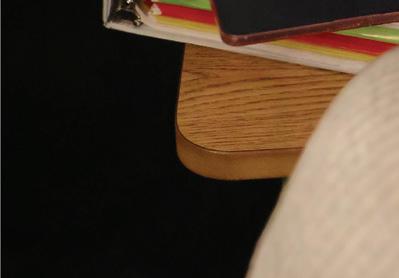





allow for that,” she said. “Instead, it’s all extremes. You’re either completely broken or totally empowered. ere’s no middle ground.”
But while the dramatization may be unrealistic, it isn’t entirely useless.
“I like how interesting it is,” Asher said of “Pretty Little Liars.” “ e storylines are just so wild. ere’s something new in every episode; it kind of gives you something to feel more emotional about.”


Between classes and homework, shows like “Euphoria”
er a break from reality and a glimpse into a world far more intense.
communicate an authentic story through vulnerability, ambiguity and discomfort — emotions that get skipped over in many of the shows marketed to them.
“Teenagers are still trying to make sense of themselves, and I don’t think these shows

ere is catharsis in the chaos. For teens wading through their own quieter versions of confusion and heartbreak, the shows can serve as both an exaggeration and a mirror. A place where the stakes are higher, the feelings louder — but the core emotions still ring familiar.
“I think teenagers are drawn to the drama because it gives them a space to project their own feelings onto something bigger,” Papin said. “ ey might not be hiding bodies, but they are dealing with real pressure. Watching these shows, they feel seen.”
And maybe that’s the appeal. Not realism but recognition. Not accuracy but intensity. e shows don’t reect what high school is, but what it sometimes feels like: overwhelming, theatrical, terrifying and thrilling.
“It’s something to distract yourself from the stress of everyday life,” Asher said. “Like, I’m not living that life — but it’s fun to watch it happen to someone else.”
In the end, the ction isn’t fooling anyone. Today’s teens know the difference between a story arc and a school day, but that doesn’t mean they’ll stop streaming. Because sometimes, the only thing better than surviving adolescence is watching someone else survive it with better lighting and a dramatic soundtrack.




Article by Taylor Gri th
Graphic by Caden Liu
e cult classic movie, “Mean Girls,” portrays an extreme version of high school popularity through super cial cliques, usually with one set of queen bees who run the school, have all the attention from the rest of the school.
Meanwhile, Trinity’s social ladder works a little differently than what movies potray.
but it did not really make me popular with other people,” Rosario said.
“To some degree, there are cliques, there are clear groupings that I would deem as getting the student council votes. But I don’t think I ever notice any of the Regina George ‘we wear pink on Wednesdays.’”
While movies portray a hierarchical social ladder, Trinity’s social groups are much less extreme.
Although movies often show football players as the most popular students on campus, junior Ishan Choksey believes that being a part of the Trinity football team does not change his social status.
“In a way, everyone is one big friend group but separated partly into their own groups,” senior Evan Glebov said.
However, not everyone thinks Trinity’s social ladder is balanced.
“ e popular groups don’t treat others the best, and make fun of you if you’re not similar to them,” sophomore Gabby Rosario said. ese so-called popular groups do not just come from making friends, usually, they spiral from sports.
While movies do accurately portray friend groups coming around sports, the o -base in depictions of those groups, leaning far too much into harmful stereotypes of groups like cheerleaders and football players. Usually, in movies, the stereotype of cheerleaders and football players are the most popular in school, but at Trinity, this isn’t necessarily true.
“Cheerleading de nitely gave me more friends in my grade and other grades,
“My social status doesn’t really change because the football team isn’t that good, and we’re also a small school, so we all essentially know each other,” Choksey said.
Psychology teacher Michael Brown also believes that at Trinity there are not really any clear cut cliques of students like there are in the movies.
“To some degree, there are cliques, there are clear groupings that I would deem as getting the student council votes,” Brown said. “But


I don’t think I ever notice any of the Regina George ‘we wear pink on Wednesdays’ thrown at others, the students that are more popular don’t seem inherently more evil.”
Even though Trinity is di erent from the movies, other schools, such as public schools, still have these cliques in place.
“Going from a public to a private school wasn’t as bad as people think it’s going to be, the social ladder is de nitely way di erent,” said Glebov, who started Trinity as a junior after transferring from Hagerty High School “I feel like there isn’t any popularity at this school just because everyone knows each other and everyone is super connected.”
Meanwhile, Choksey agrees that Trinity’s uniquely small student body means it lacks the social hierarchy of public schools and that portrayed in movies.
“Since Trinity is such a small school and we all know each other I feel like social status is not really a big deal, it’s just about having your friends,” Choksey said.


Article by Emily Lopez
Photo by Maxi De La Fuente
Although “Severance” fans were forced to wait three long years for the premiere of its second season, the wait was most definitely worth it. The show is incredibly, impressively idiosyncratic, and the writers will take you down to some of the deepest rabbit holes in cinema history. Sit back and grab some popcorn because this is one show you don’t want to miss.
The premise of the series lies in the “Severance” procedure, where workers undergo brain surgery to sever their work memories (innies) from their out-of-office identities (outies). The storyline follows Mark S. (Adam Scott) and his colleagues on the “severed floor” through their adventures and revelations about the true purpose of the company they work for, Lumon Industries.
The promise attached to the severance procedure is alluring, as it grants people a literal work-life balance. Outies essentially give life to fully formed humans without considering the consequences of their decision. Since Lumon isn’t so quick to advertise the fact that innies are given virtually zero free will, the concept sounds super appealing to outies, while their innies are trapped in a miserable, inescapable existence.
Throughout the season, philosophical conundrums begin to pile up as characters attempt to interlink their work lives with their personal lives. Mark’s desperate attempt at reintegration — a process that would supposedly relink his innie’s and outie’s memories — led to complications between his character’s two love interests, Helly R. (played by Britt Lower) and Gemma Scout (played by Dichen Lachman). Forced to choose between his innie’s office crush and his outie’s wife, Mark is stuck arguing with his alter ego over which girl he gets to go home to. In the season finale, Ms. Cobel (Mark’s boss as Lumon) reminds him that there will “be no honeymoon ending for (him) and Helly R.,” enraging his already hopeless innie even more.
Apart from its compelling storyline and keep-you-up-all-night thriller moments, the
success of “Severance” heavily relies on its unique cinematography choices. The most notable camera trick in the show is the Dolly Zoom effect, which is used on the Lumon elevator rides as each character transitions from their outie self to innie self and vice versa. In these shots, the camera moves closer while zooming to a wider angle lens, resulting in a dramatic reshaping of facial features.
Part of what makes “Severance” spectacular is its intentionality. The directors made sure every small detail had a purpose, so don’t be so quick to overlook the minor things like color thematics and the seemingly perfect symmetry in every shot. You might notice that scenes inside Lumon stick to the same two to three colors, while there is far more experimentation with color when we get a peek at the characters’ lives outside of work. “Severance” set director Andrew Baseman addresses this in an interview with Variety Artisans presented by HBO. “We wanted the outside world to have much more warmth and color, rather than the very tight color palette of Lumon, which is predominantly green and blue,” Baseman said.
Another brave stylistic choice was the sequencing of two back-to-back bottle episodes in season two. The first, titled “Chikhai Bardo,” was centered around Mark’s life before severing, with a huge focus on his relationship with his wife Gemma. This is arguably one of the best episodes in the entire series, as it finally reveals the answers to some pressing questions from earlier in the season and simply holds its own as a straight-up cinematic masterpiece. Following this episode is “Sweet Vitriol,” which reveals — let’s be real, no one’s favorite character — Ms. Cobel’s background. While neither episode is in any way unwatchable, the decision to order these consecutively hurts the pacing of the show.
For a trippy psychological thriller that demands all of your attention, you shouldn’t discredit “Severance’s” ability to bring out some deep emotions in its viewers. “Severance” will do more than mess with your mind. It might just make your eyes water.





Article by Skyler Campbell
Photo courtesy of Rylan Smith
During a counseling session, Guidance Counselor Rylan Smith noticed that her student was having trouble opening up about their struggles. When Bailey, Smith’s therapy dog, was brought into the room, the student immediately began to relax, and Smith watched in amazement as the child opened up about their home life while petting Bailey.
“It’s allowed me to communicate with kids who maybe would not have approached me otherwise,” Smith said. “They’re telling me stuff that they wouldn’t have told me if they didn’t have Bailey there.”
Smith has had an affinity for dogs since she was little. They’ve helped her tremendously as she has navigated through her life, and because of this, she hoped to share the calming power of dogs with other people who are struggling.
“It’s kind of been a dream of mine,” Smith said. “I have always had animals in the house growing up, and I know the power that they possess. I’ve witnessed people being scared or (in) high emotions or that sort of stuff, and then all of a sudden they have animals come up and it’s like everything washes away.”
Petting a dog releases a hormone called dopamine, which allows your body to enter a happy and tranquil state. This effect can be very useful when dealing with highly tense or upsetting situations.
Because of their ability to make people comfortable in stressful situations, Smith found dogs to be the perfect partner in her field of work.
this way. In the U.S. alone, different organizations like the American Kennel Club have helped give back to the community by training over 50,000 therapy dogs for people who need them.
“We put in over 100 hours of observed hours [of service] in different environments,” Smith said. “From nursing homes to fire sta-
are trained to help with significantly different procedures. Therapy dogs visit hospitals to help bring a bit of joy and comfort to the people who are going through a tough time. To be able to do events like this, therapy dogs have to go through coaching and earn multiple certificates to prove themselves able to provide comfort to the public.

“I know how they make me feel,” Smith said. “So between that and then knowing I wanted to go into counseling, it just seemed like a good mix. (It) was a nice fit to have a therapy dog that I can still use some of my same counseling skills with.”
Smith is not the only counselor who feels
tions to malls anywhere, we could desensitize them to all different types of things.”
A common misconception is that therapy dogs are the same as service dogs and emotional support dogs. In reality, these animals
Therapy dogs are specifically trained to provide comfort to people, as well as give some relief from anxiety and stress. These dogs are often taken to nursing homes, schools, or even rehabilitation centers to help out the people there. A therapy dog’s tasks vary from those of a service dog, which is trained to provide a specific medical task, or an emotional support dog, which doesn’t have any specific training.
Not all dogs are suitable candidates to support others in therapy, however. Dogs are normally chosen based on their temperament and level of comfort in a variety of situations. Bailey was an easy pick for therapy dog training, given he is very level-headed and from a very smart and willing breed.
“Bailey’s got golden in him, which gives him some of that same temperament, and the border probably makes him smart, which is nice because it’s intuitive,” Smith said.
Smith’s love of dogs and her desire to help people have led both her and Bailey far in their careers. Even after she retires, Smith hopes to continue to be able to bring comfort to those around her using therapy dogs.
“I would love to, especially when I retire, to have a therapy dog that I can take and go to different places and do different things with just as a way to give back to the community,” Smith said.


Article by Gabrielle Williams
Graphic by Maxi De La Fuente
Summer trips are the perfect chance to relax and unwind after a long year of work, school and stress. Most people take this opportunity to travel somewhere on their bucket list, but the Kalmanson family has their own unique way of selecting trips. ey don’t decide where to go on trips; the tickets do.
“(My dad) will look for plane ights and pick where he can get cheap enough plane ights,” junior Brooke Kalmanson said. “And then my mom plans the actual activities once he picks the location.”

Sophomore Olivia Patino is also a frequent traveler who attended her rst school-sponsored trip to Spain in the summer before her 10th-grade year.
“ is trip was very planned out; I just wish there had been some more free time because

so much about other people, and you learn so much about yourself. You learn about how you respond in di erent situations.”
Gaining knowledge through travel is a very important way to learn, whether it be about the destination or other people.
“I really believe that traveling as a teacher can be so valuable beyond going to a cool location,” McGimsey said. “Students (and teachers) are di erent people sitting in a classroom than they are out exploring the world.”


Because of this unique approach, the Kalmansons have gone to places like Bolivia, Uganda and Nicaragua. is past spring break, they went to Malaysia, Borneo and Brunei.




“I liked Brunei the most,” senior Zara Kalmanson said. “It was almost deserted in a way, and their population is less than the city of Orlando. It was a place I’ve seen that a lot of people haven’t seen.”



Although Zara Kalmanson feels grateful to have been to these places, she is excited to start her solo travel journey in her college years.





“I’m de nitely going to be studying abroad,” Zara Kalmanson said. “I’ve gone to a lot of the exotic places with my parents, so now I want to go to some of the more basic destinations. Spain, Japan or South Africa; those are good places to go.”
So far, Zara Kalmanson has been to 43 countries in her life, while Brooke Kalmanson has been to 44. ey travel with their friend Maiori Butz, a junior. Over the many years they have been traveling together, the three of them have learned a lot and are extremely grateful to have been to these places.
“You can nd beauty in every destination, and there’s something for tourists in every single place,” Zara Kalmanson said. “When you study things in a history class and see them on paper in a textbook, it’s way di erent when you go and see it. e memory doesn’t click in the same way.”

Spain is beautiful, and I know because
I’ve been there before,” Patino said. “ is made me see a di erent side of it; we did a lot in nine days, so it was really cool to see everything. on our own.” is year, Trinity hopes to improve their travel plans by having former Upper School Dean of Students Kyle McGimsey take over the role of Coordinator of Global and Domestic Travel. He feels that having the opportunity for students to travel abroad builds key characteristics for their future.
“It’s not always learning facts about historical sites and buildings,” McGimsey said. “You learn





to a trendy place; you might love something

If you’re thinking about where to plan your trip this summer, think twice before you book a trip to a trendy place; you might love something unexpected a lot more.”



“Since than every

“Since it’s a trip for you, it’s di erent than what anyone else is doing,” Brooke Kalmanson said. “You have to nd what you like. In every country, there are certain places for di erent types of people.”


Summer o ers the perfect window to travel, re ect and learn something new. No matter how out of your comfort zone that trip is, there is always something to take away from it.
“Being exposed to so many di erent cultures, foods, people and their way of lives showed me a lot not to judge someone based on where they’re from before I see it,” Maiori Butz said. “Some of these places are not what I expected, and those places I thought I would love, sometimes I didn’t like it as much. I’m always open to everything; I’m learning.”
1 - Sophomore Olivia Patino, juniors Macyn Singleton and Isabel Manrressa, and senior Sylvia Stark attends a school summer trip to Cordoba, Spain summer of 2024.
2 - Junior Maiori Butz, freshman brother Alex Butz, and friends Brooke and Zara Kalmanson poses in the Balkans. ey had taken a stop on their ride in Bosnia and Herzegovina.
3 - e Kalmanson family enjoys their trip to Morocco. is photo was taken before they got to ride a hot air balloon.


Article by Ben Kleiman
Graphic by Natalie Baron
It doesn’t look much di erent than any other bat. Same length. Same material. But a slight shift in the barrel on the bat has turned the torpedo bat into baseball’s most controversial and powerful equipment.
By subtly shifting the sweet spot lower and closer to the hitter’s hands, the torpedo bat is designed to bring the sweet spot in line with where many players tend to make contact. is adjustment on the bat has been met with criticism from baseball fans after the New York Yankees hit a record-setting 18 home runs in their rst four games of the season. Five of the Yankee players who hit home runs were using the torpedo bat, and they accounted for 11 of the 18 home runs. However, Rule 3.02 requires bats to be no more than 2.61 inches in diameter, no longer than 42 inches, and made from one piece of solid wood.
e torpedo bat was an innovation created by Aaron Leanhardt, a physicist at the Massachusetts Institute of Technology, who joined the Yankees’ analytics department in 2022. After spending time with players in the minors, Leanhardt noticed that the players were often missing the ball or hitting it awkwardly instead of making solid contact.

By moving the bat’s sweet spot closer to where the hitters naturally made contact, Leanhardt created a weapon that made it easier to generate clean, hard contact. e Yankees began using them in the Minor League before introducing them in Major League Baseball (MLB) last season during the American League Championship Series (ALCS).
Giancarlo Stanton began using the bat during the 2024 season. He crushed four home runs during the ALCS against the Guardians and was named Most Valuable Player of the series. But what many didn’t know at the time: Stanton was playing through pain in both elbows. He told reporters his elbow issues could have been related to “ some bat adjustments.”

e bat seemed to help him stay productive despite injury, though it seems that the modi cation may have been the cause, due to the altered swing mechanics and di erent bat. e change in swing path and muscle usage could force hitters to compensate in ways they are not used to. Players may start to put pressure on their elbows, wrists and shoulders over the course of a 162 game season. If the torpedo bat is going to stick

around for a long time, player safety and long-term health may become part of the discussion just as much as performance.
While the torpedo bat still technically ts the MLB’s requirements for equipment under Rule 3.02, some players and fans like Youth Baseball Umpire and varsity baseball player Matias Morales argue it crosses an ethical line.
“(It’s) de nitely an unfair advantage,” Morales said. “ ere’s a catcher for the Yankees, Austin Wells, who hit a home run o the lower end of the bat. You’re not supposed to hit a home run like that. With a regular bat, it probably would’ve been a routine y out or even broken the bat. It gives people home runs for free.”
Not everyone sees the torpedo bats as a problem for the game of baseball. Some argue that innovation is simply a natural part of the game’s evolution.
“Players are doing everything to try to get an edge today legally, and I think they should,” Milwaukee Brewers manager Pat Murphy said in an ESPN interview. “I think whatever is good for the o ensive side of the game is good for the game of baseball.”
While the motivation is understandable, players believe some argue that the result is an unfair edge. ey believe that the bats may help hitters keep up with rising pitch velocity and increasingly talented elders, but they also alter the game’s balance in a way that feels unnatural.






“Pretty much every pitcher throws 100 miles an hour,” Morales said. “( e new bats) show that the game is advancing, though at the same time we’re trying to nd ways to catch up. We should stop using (them), so players can learn how to hit the ball without assistance.”

Nine Trinity athletes commit to continue their sports at the next level
Article by David Hull and Steinberg























University of virginia







“At 6-foot-3, Stillman has the kind of projectable frame teams look for in high school arms, and when combined with his feel for pitching, it’s easy to see why scouts are excited to see what’s to come from this southpaw.”



- MLB Scouts



“He’s always around the zone and has a very good understanding at a young age of how to set up hitters.”



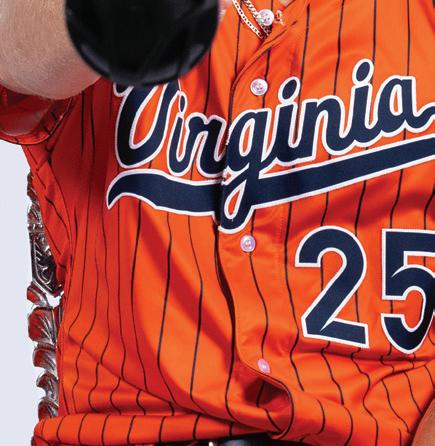








“I am looking forward to facing the best competition and being able to dedicate even more time to the game I love.”

















“I’m looking forward to the memories I’ll make with my new teammates and trying to make a deep run into the NCAA tournament.”
- Wilder Judelson, Colorado College

“I chose George Washington because of its amazing academics and the ability to compete at the highest level.”
- Laziza Talipova, George Washington Univeristy

“I am looking forward to the new levels of competition and skills I will learn. I also can’t wait to make new friends on the team.”
- Trevor Hopkins, Johnson and Wales University
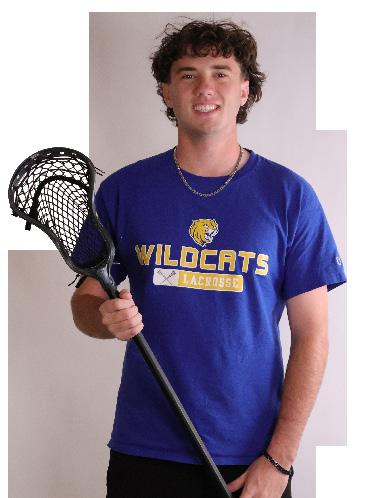
“I’m looking forward to being part of a big team, especially participating in important competitions like conference and NCAAs in March and February.”
-Danika Senekal, Nova Southeastern University

Puzzles by Mila Taylor












5. A teen show that exaggerates teen life and revolves around the death of a classmate in a small town.
6. Number of students attending speech and debate nationals.
7. Petting a dog releases this type of hormone.
1. The TPS cybersecurity team won this competition in their first year competing.
2. Chess player who inspired “The Queens Gambit”
3. Type of bat that has become very controversial in the world of baseball.

4. America has too many gosh darn ______ AP Exams






Crossword answers can be found in our newspaper!